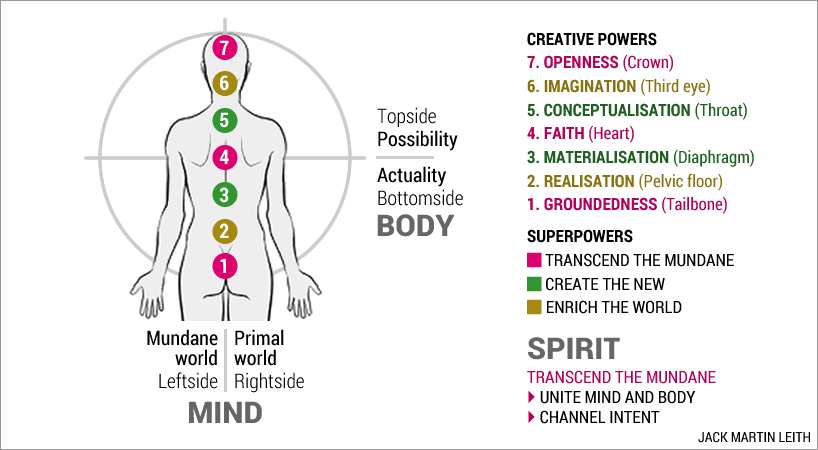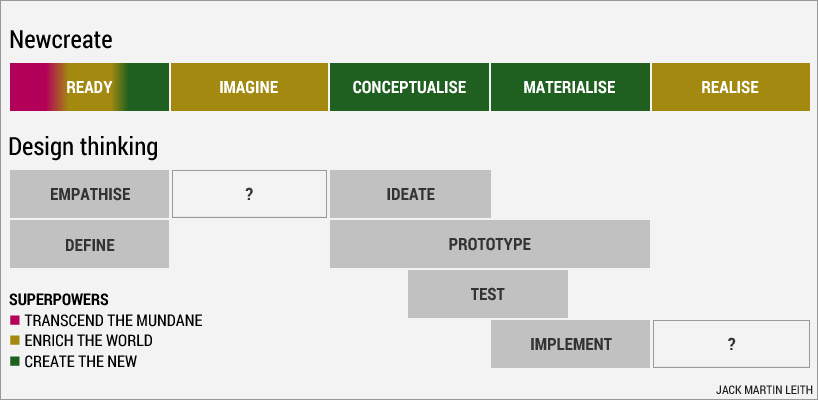Jump ahead and read about the synthetic and creative forms of imagination
Design thinking
In the 1990s, David Kelley and Tim Brown of the global design and innovation company IDEO, along with strategy exponent Roger Martin, brought together principles, concepts and methods that had been brewing for many years, distilled them into a unified concept and named it design thinking.
Design thinking consists of five non-linear, iterative phases or types of activity: Empathize, Define, Ideate, Prototype, and Test. Nielsen Norman Group adds a sixth phase, Implement. Others use different labels, or include additional phases, or both.
In 2022, IDEO adopted a six-aspect design thinking process: Frame a question; Gather inspiration; Generate ideas; Make ideas tangible; Test to learn; Share the story. The firm also talks about “the three core activities of design thinking: Inspiration, Ideation and Implementation”.
In the Harvard Business Review explainer video below (runtime 2:23), a three stage process is presented:
- Invent a future. Observe and ask questions.
- Test ideas and adjust.
- Bring the new product or service to life.
Design thinking is not a codified method, but rather a certain way of thinking and acting. Although each consulting firm, corporate team or entrepreneur will practise design thinking in their own way using their own methods, most design thinking projects will display the following characteristics:Design thinking is both an ideology and a process that seeks to solve complex problems in a user-centric way. It focuses on achieving practical results and solutions that are:
- Technically feasible: They can be developed into functional products or processes;
- Economically viable: The business can afford to implement them;
- Desirable for the user: They meet a real human need.
What is design thinking, and how do we apply it? on InVisionApp wesite
- The needs and concerns of the intended customers or users are kept to the fore.
- Work is undertaken by a multidisciplinary team.
- Work is nonlinear and iterative.
- Experimentation is encouraged. Testing and prototyping begin early.
- There are multiple periods of diverge-converge work. Some refer to each period as a diamond — see for example the Design Council’s Double Diamond framework.
- The primary Idea generation method is brainstorming or one of its derivatives.
Newcreate
This is the essence of Newcreate:
- We are here to transcend the mundane, create the new and enrich the world (or a particular piece of it) with value, meaning and joy.
- The human being is the principal Now-to-New instrument, using three ‘selves’ — mental, physical and spiritual — to bring the new into being.
- World-enriching Now-to-New projects call for breakthrough ideas conceived by means of creative (not synthetic) imagination.
- Upstream idea conception and elaboration and downstream value realisition are equally important and interdependent.
We are here to transcend the mundane, create the new and enrich the world (or a particular piece of it) with value, meaning and joy.
Unconditional service is selfless action taken for the benefit of others, motivated by a fervent desire to enrich the world or a particular piece of it. When we give unconditional service, we help others without wanting anything in return.You are not here merely to make a living. You are here in order to enable the world to live more amply, with greater vision, with a finer spirit of hope and achievement. You are here to enrich the world, and you impoverish yourself if you forget the errand.
Woodrow Wilson, US President from 1913 to 1921
View a transcript of the address that includes this passage | Note that he actually said “You are not here merely to prepare to make a living.” (He was addressing undergraduates.)
Coming from the heart, unconditional service is unconditional love made manifest through generative action. Unconditional service doesn’t make sense to the rational mind, the source of conditional, reciprocal service. But when we provide unconditional service, our faith — “a critical but curious mind’s readiness to adopt a reality model (even if provisionally) for which there is less than absolute, empirical proof”1 — is vindicated.
1. Jay B. Gaskill, The Dialogic Imperative.
Read more about unconditional serviceThe human being is the principal Now-to-New instrument, using three ‘selves’ — mental, physical and spiritual — to bring the new into being.

Mental self
The mind can lean towards the left and mundane world, where we are limited to synthetic imagination, or towards the right and primal world, where we gain access to creative imagination.
 Newcreators recognise that an idea is conceived in the imagination of an individual, not in some fanciful group mind.
Newcreators recognise that an idea is conceived in the imagination of an individual, not in some fanciful group mind.Read more about synthetic and creative forms of imaginationOur species is the only creative species, and it has only one creative instrument, the individual mind and spirit of man. Nothing was ever created by two men. There are no good collaborations, whether in music, in art, in poetry, in mathematics, in philosophy. Once the miracle of creation has taken place, the group can build and extend it, but the group never invents anything. The preciousness lies in the lonely mind of a man.
John Steinbeck, cited by Roger S Bacon in The Myth of the Myth of the Lone Genius
Read about Think and Grow Rich!
Download Think and Grow Rich! for free, in its entirety (pdf; 397 pages)
Physical self
Newcreators embody seven creative powers: Openness, Imagination, Conceptualisation, Faith, Materialisation, Realisation and Groundedness. These combine to form three superpowers: Transcend the Mundane, Create the New, and Enrich the World.

This is an embodied metaphor and does not need to be taken literally.
The superpower Transcend the Mundane must be activated in order to bring the other superpowers, Enrich the World and Create the New, into play.
Read more about the seven creative powers and three superpowers
Spiritual self
Intent — what many people call spirit — is the generative impulse that streams from the unmanifest into the manifest through the gap in time.
It has two aspects. One is the originating aspect, which is concerned with initiating new creations. The other is the fulfilling aspect, which is concerned with bringing these creations to fruition and fully realising their value generation potential..
When the Newcreator transcends the mundane by having faith in the heart, an open mind and a grounded body, then leftside, rightside, topside and bottomside unite, and he or she is ready to incorporate intent into his or her being.People say “spiritual jazz, spiritual jazz”, but no one goes: “what is spirit?” To me, it’s simple – in the English language, to be spirited is to have a force that brings you up, that animates you out of inertia.
Shabaka Hutchings, jazz musician and composer, in The Guardian (view)
World-enriching Now-to-New projects call for breakthrough ideas conceived by means of creative (not synthetic) imagination.
A breakthrough idea is one that is potent (showing significant value generation potential) and fitting (the key fits the lock).
Read more about the Newcreate way of conceiving breakthrough ideas
Upstream idea conception and elaboration and downstream value realisition are equally important and interdependent.
An idea, no matter how apparently brilliant, is impotent if uptake and subsequent value realisation are unachievable with available resources.
I have experienced this sorry state of affairs at great personal cost.
The design of the value generator (product, service, facility, artistic work etc) must take into account downstream uptake and value realisation from the outset.
This is why Enrich the World work takes precedence over Create the New undertakings.
Could the value generation potential of design thinking be boosted?
Design thinking is the most widely adopted Now-to-New practice in the organisational realm.
I am certain that design thinking practitioners would enhance their Now-to-New work significantly by combining design thinking with Newcreate.
Their creations would be poised to generate more value, meaning and joy.
The creative capabilities of the Newcreators would be expanded and fully utilised.
And the Newcreators would experience greater value, meaning and joy themselves.
Continue reading
External websites
10 Insightful Design Thinking Frameworks: A Quick Overview, by Rikke Friis Dam and Teo Yu Siang, on Interaction Designn Foundation website
Design Thinking 101, by Sarah Gibbons, on Nielsen Norman Group website
Design Thinking Misses the Mark, by Anne-Laure Fayard & Sarah Fathallah, in Stanford Social Innovation Review
Design thinking was supposed to fix the world. Where did it go wrong? by Rebecca Ackermann in MIT Technology Review
Design Thinking: A Quick Overview, by Rikke Dam and Teo Siang
How to solve problems with design thinking, a collection of articles on the McKinsey & Company website (no paywall)
Making Sense of: “Design Thinking is Bullshit” by GK VanPatter, co-founder of Humantific, on LinkedIn
ReThinking Design Thinking, a book by GK VanPatter with contributions from Elizabeth Pastor and Peter Jones
Storming Design Thinking, by GK VanPatter
What is Design Thinking? on McKinsey & Company website
What is Design Thinking and Why Is It So Popular? by Rikke Friis Dam and Teo Yu Siang, on Interaction Design Foundation website
This website
Beneficiaries, beneficiary groups and beneficiary sets
How Newcreators use mind, body and spirit to create the new and enrich the world
How to put Newcreate into practice
Imagination — synthetic and creative
Newcreate and other Now-to-New methods
The Newcreate way of conceiving breakthrough ideas
How to specify the value your new creation will generate
Transcend the mundane: what, why and how
Index to entire site (60+ pages)
Search the site
Not case sensitive. Do not to hit return.
